What requests for blanket pardons tell us about Jan. 6 defenders
The sharpest opinions on the debate from around the web

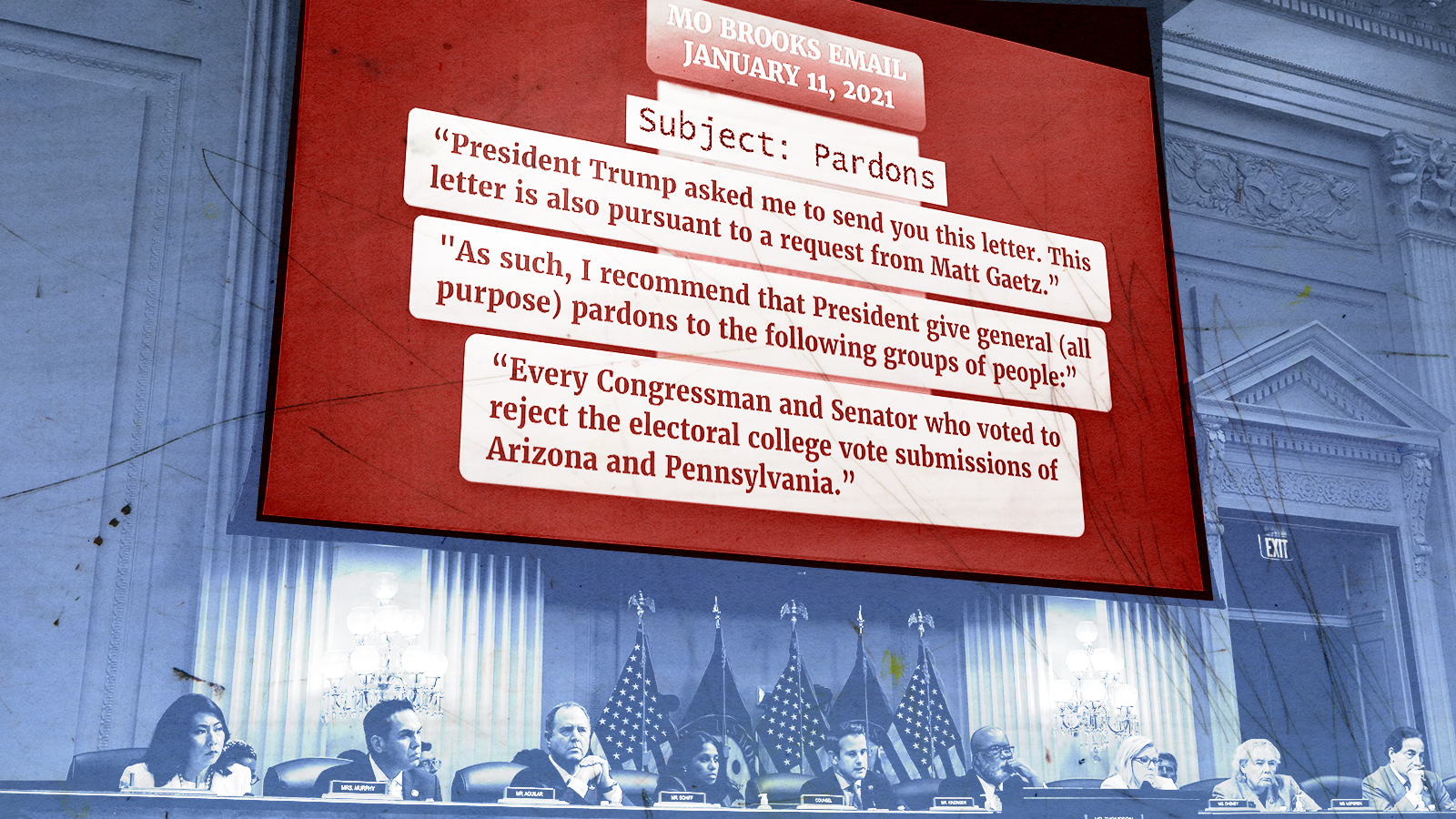
A free daily email with the biggest news stories of the day – and the best features from TheWeek.com
You are now subscribed
Your newsletter sign-up was successful
Several bombshells were dropped on Thursday during the House Jan. 6 committee's latest public hearing, including several witnesses testifying that multiple Republican members of Congress sought pardons from former President Donald Trump. They said the lawmakers — identified as Reps. Andy Biggs (Ariz.), Mo Brooks (Ala.), Matt Gaetz (Fla.), Louie Gohmert (Texas), and Scott Perry (Pa.) — pushed for pardons after being vocal proponents of Trump's false claim that the election was stolen from him.
The committee played recorded depositions from some of these witnesses, including Cassidy Hutchinson, a former aide to Trump's final White House chief of staff, Mark Meadows. She told the panel that Gaetz "was personally pushing for a pardon, and he was doing so since early December. I'm not sure why. Mr. Gaetz had reached out to me to ask if he could have a meeting with Mr. Meadows about receiving a presidential pardon."
Eric Herschmann, a former Trump White House lawyer, testified that the "general tone was, 'We may get prosecuted because we were defensive of, you know, the president's positions on these things.'" The pardon Gaetz "was discussing, requesting, was as broad as you could describe, from the beginning of time up until today, for any and all things." Gaetz is being investigated by the Department of Justice over whether he had a sexual relationship with a 17-year-old and violated federal sex trafficking laws, The New York Times first reported last year; Gaetz has denied the allegations.
The Week
Escape your echo chamber. Get the facts behind the news, plus analysis from multiple perspectives.

Sign up for The Week's Free Newsletters
From our morning news briefing to a weekly Good News Newsletter, get the best of The Week delivered directly to your inbox.
From our morning news briefing to a weekly Good News Newsletter, get the best of The Week delivered directly to your inbox.
Pardon me?
Rep. Liz Cheney (R-Wyo.), vice chair of the Jan. 6 committee, had previously mentioned some Republican lawmakers asked for pardons, but as soon as names were dropped on Thursday, pundits pounced. Joyce Vance, a former U.S. attorney and MSNBC analyst, tweeted, "Not surprised Matt Gaetz would want a pardon for all things from the beginning of time."
Attorney Ron Filipkowski took the opportunity to compare Rep. Adam Kinzinger (R-Ill.), a member of the Jan. 6 committee who is not seeking re-election, to those who sought pardons, writing, "Adam Kinzinger sacrificed his House seat to maintain his integrity. While his colleagues who call him a traitor were secretly asking for pardons." Lincoln Project co-founder Rick Wilson found these requests a sign of larger issues, tweeting, "The idea there were BLANKET pardons under discussion is not what happens in a functioning democracy."
Pardons aren't illegal, but...
It isn't a crime to request a pardon, but as Nick Akerman, a deputy special prosecutor during the Watergate trial, told The Independent, when a person requests one, it's a good indicator the individual is aware they broke the law. "This is obvious evidence of someone who believes they committed a crime and is concerned about being prosecuted — an innocent person does not ask for a pardon," he said. "A request for a pardon, when there is not even an investigation going on, is overwhelming evidence of consciousness of guilt."
The Washington Post's Aaron Blake described the plot to overturn the election as "far-fetched," and noted the Jan. 6 committee has shown that the people involved were told multiple times their plan was illegal. Given all that, Blake wrote, "the fact that people were trying to cover their backsides on the way out is important."
A free daily email with the biggest news stories of the day – and the best features from TheWeek.com
Repercussions ahead?
Most of the lawmakers that the committee said asked for pardons have denied doing so, with Biggs claiming Hutchinson was "mistaken" and her testimony was edited "deceptively." Brooks, however, admitted he did seek a pardon; the Jan. 6 committee has in its possession an email he sent the White House seeking a preemptive pardon for the 147 members of Congress who objected to the certification of President Biden's electoral win. Brooks said he did this because he was concerned the Department of Justice under Biden might target him and other Republicans.
Brooks also announced he will testify before the Jan. 6 committee if certain conditions are met. He wants to be questioned by members of the panel directly, not their staffers, and will only answer questions that are "relevant to, and limited to" events surrounding the Capitol attack. He participated in the "Stop the Steal" rally that took place right before the Capitol riot, and was close to Trump until a few weeks ago, when Trump rescinded his endorsement of Brooks in Alabama's GOP Senate primary. Trump decided to instead back first-time candidate Katie Britt, who won.
Several Democratic candidates are now tying their opponents to Brooks and his blanket pardon appeal. Matt Castelli, who aims to unseat Rep. Elise Stefanik (R-N.Y.), tweeted that he wants to know whether Stefanik, who voted against certifying the election results, "knowingly broke the law and coordinated with Rep. Mo Brooks and others to seek a pardon." Charles Booker, a Senate candidate in Kentucky, tweeted a photo of Sen. Rand Paul (R-Ky.) with Brooks, tweeting, "Mo Brooks sought pardons. Rand Paul stood by his side every step of the way. Mo lost this week. In November, let's make sure Rand suffers the same fate."
Norm Eisen, a senior fellow at Brookings Governance Studies and a CNN analyst, noted the lawmakers who were "demanding pardons" all helped Trump both before and after Capitol attack, and that made him "think of 18 USC 201: A public official who corruptly seeks anything of value in return for an official act or colluding in fraud shall be imprisoned for up to 15 years and disqualified from office."
Catherine Garcia has worked as a senior writer at The Week since 2014. Her writing and reporting have appeared in Entertainment Weekly, The New York Times, Wirecutter, NBC News and "The Book of Jezebel," among others. She's a graduate of the University of Redlands and the Columbia University Graduate School of Journalism.
-
 How to Get to Heaven from Belfast: a ‘highly entertaining ride’
How to Get to Heaven from Belfast: a ‘highly entertaining ride’The Week Recommends Mystery-comedy from the creator of Derry Girls should be ‘your new binge-watch’
-
 The 8 best TV shows of the 1960s
The 8 best TV shows of the 1960sThe standout shows of this decade take viewers from outer space to the Wild West
-
 Microdramas are booming
Microdramas are boomingUnder the radar Scroll to watch a whole movie
-
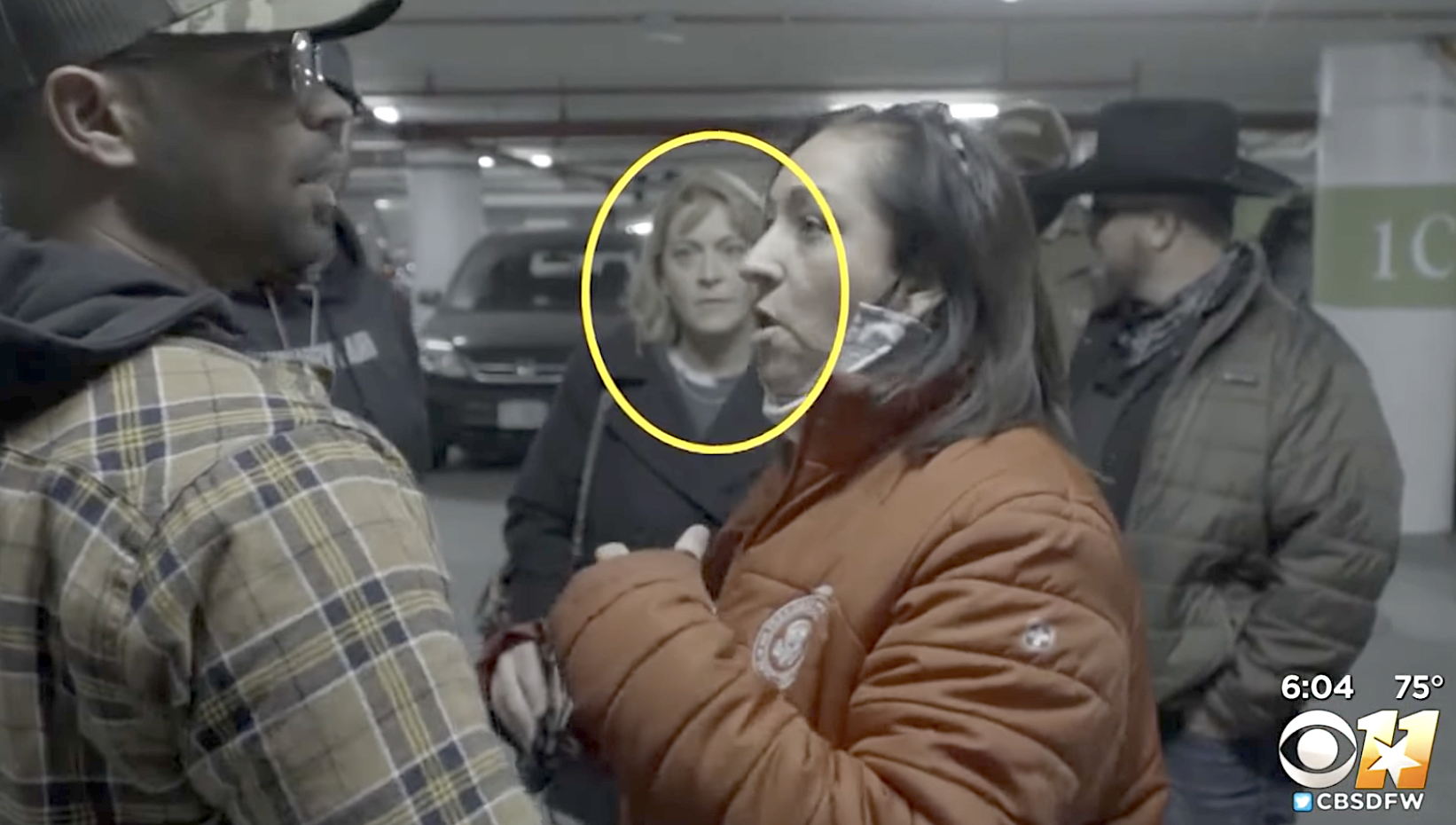 Oath Keepers lawyer indicted on Jan. 6 charges
Oath Keepers lawyer indicted on Jan. 6 chargesSpeed Read
-
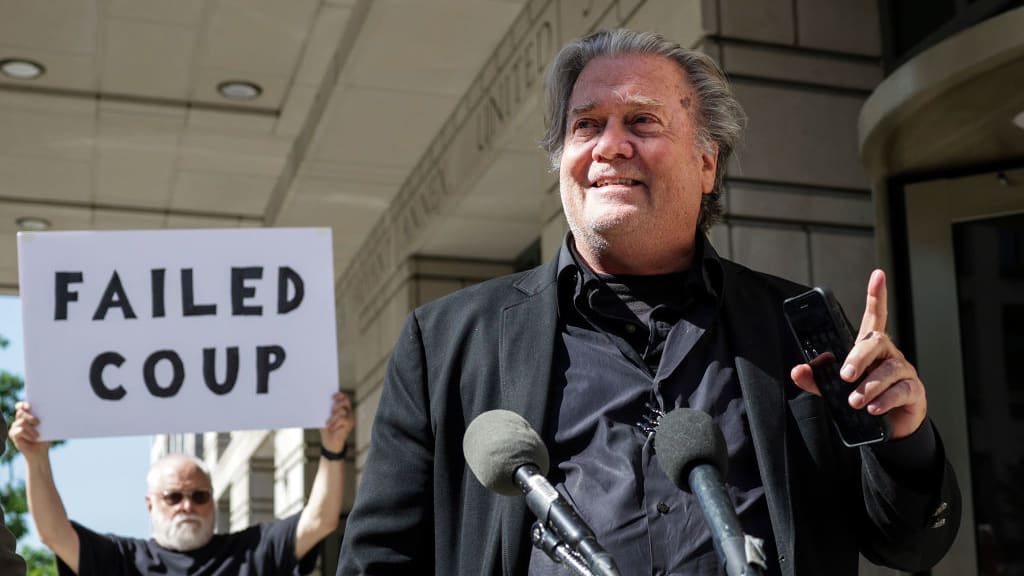 Federal judge denies Bannon's bid to delay contempt trial
Federal judge denies Bannon's bid to delay contempt trialSpeed Read
-
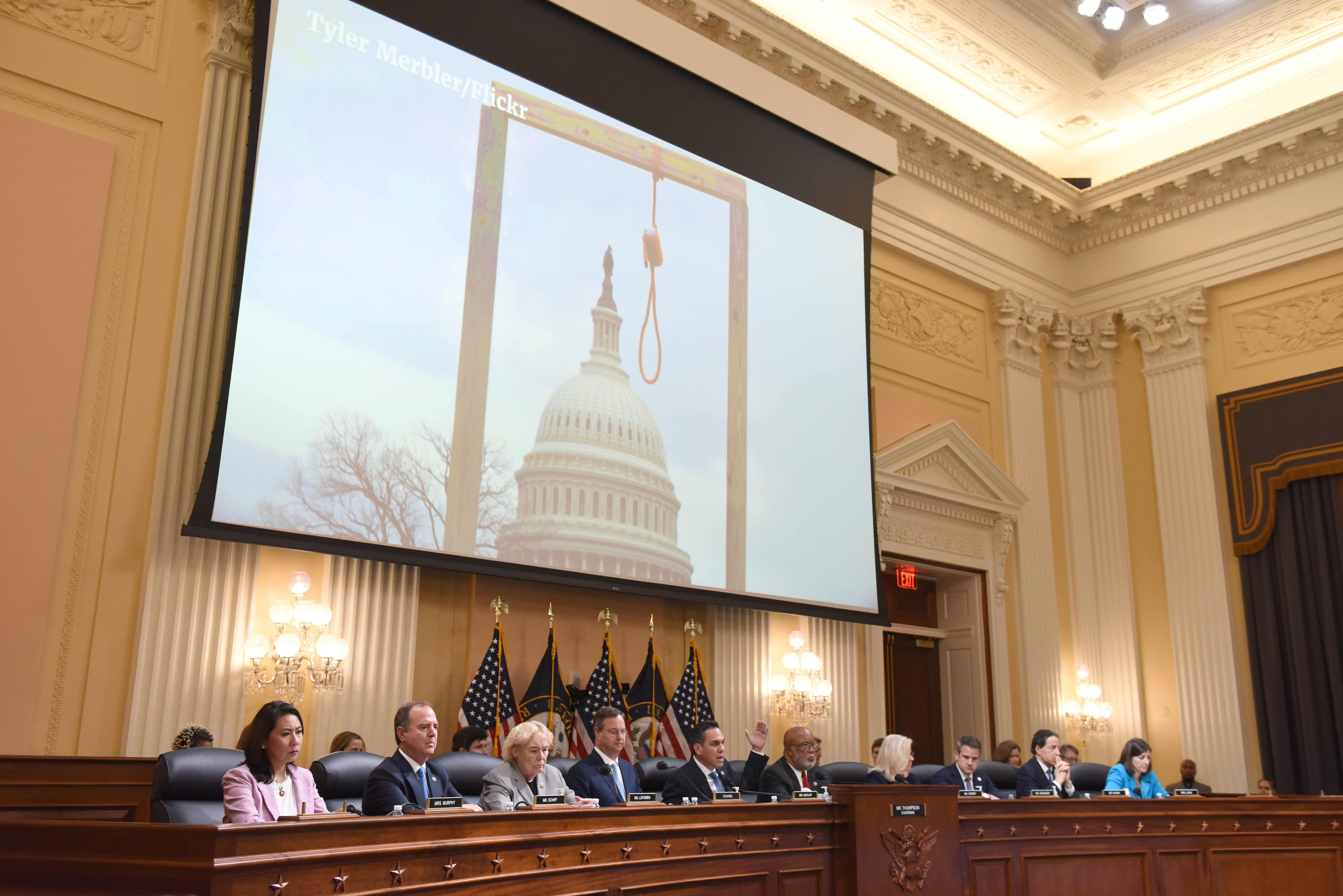 Everything we learned from the 3rd Jan. 6 hearing
Everything we learned from the 3rd Jan. 6 hearingSpeed Read 'Get a great effing criminal defense lawyer. You're gonna need it.'
-
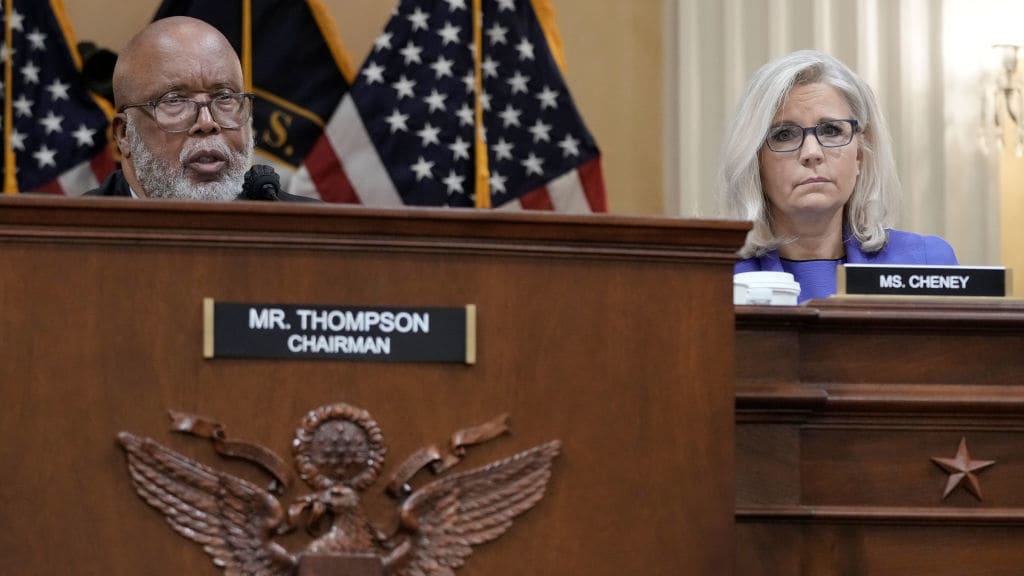 Jan. 6 committee says several GOP lawmakers sought pardons from Trump after Capitol attack
Jan. 6 committee says several GOP lawmakers sought pardons from Trump after Capitol attackSpeed Read
-
 A short history of Congress on TV
A short history of Congress on TVSpeed Read Sometimes history gets made. Unless it doesn't.
